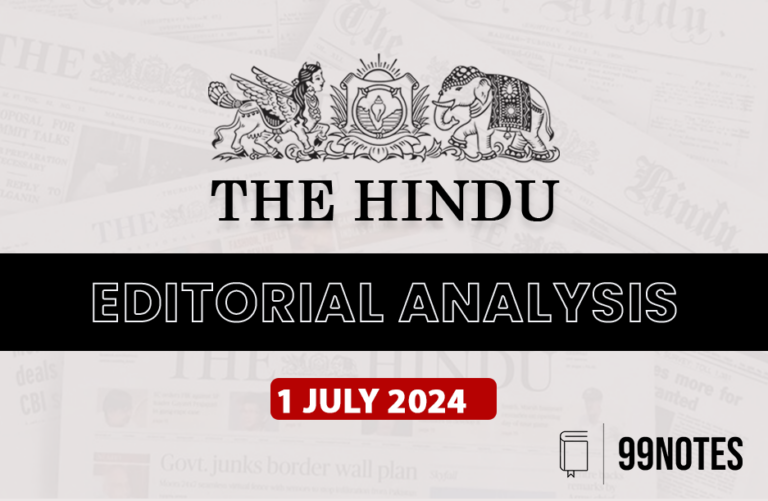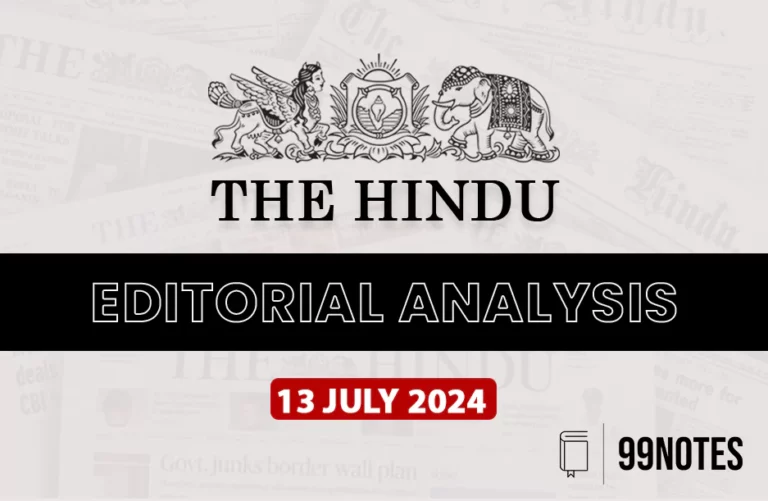13 July 2023 : The Hindu Editorial Notes PDF
The Hindu Editorial
13-July-2023
Daily Current Affairs For UPSC ,The Hindu Editorial Summary
1. Loot, intransigence, and the darkening of a colonial blot.
Topic: GS1 – History.
Context:
- The recent return of looted artefacts by the Netherlands from Indonesia and Sri Lanka has raised the question of whether colonial countries should continue to hold on to stolen cultural artefacts or return them to their original homelands.
The issue of returning looted items:
- The British have been reluctant to return items like the Elgin Marbles and the Rosetta Stone, but they have shown some generosity in repatriating some of the Benin Bronzes to Nigeria.
- The return of stolen cultural artefacts is seen as a moral obligation owed by the West to its former colonies, similar to the justification for financial reparations due to the wealth accumulated through colonial exploitation.
- Repatriating cultural items is a simpler solution compared to financial reparations, as the money extracted from colonies has already been spent.
- The return of these items serves as a symbolic gesture of justice and acknowledgment of past wrongs, particularly when considering the lasting trauma caused by colonialism.
What Britain can do?
- The author suggests that true atonement should involve teaching colonial history, setting up a museum on the horrors of colonialism, and offering apologies to the victims of colonialism.
- The British government is encouraged to follow the examples of Willy Brandt and Justin Trudeau in offering genuine contrition and making significant gestures of atonement, such as apologizing at Jallianwala Bagh and building a Museum of Colonialism.
- True atonement would involve a serious consideration of historical responsibility rather than simply admitting guilt or providing monetary compensation.
Challenges of repatriation of looted items:
- Ownership disputes: Determining the rightful owners of looted items can be complex. Over time, ownership may have changed hands multiple times, making it difficult to establish clear ownership claims. Disputes may arise between the countries from which the items were looted and the current possessors, often museums or private collectors.
- International laws and regulations: Legal frameworks surrounding the repatriation of cultural artefacts can be intricate. International laws, such as UNESCO conventions, provide guidelines for the return of stolen cultural property. However, not all countries have ratified these conventions, which can impede the legal basis for repatriation.
- Preservation and conservation concerns: Cultural artefacts often require specialized care and preservation techniques. Concerns about the ability of the original homeland to adequately preserve and protect the items may arise, especially if there are insufficient resources or infrastructure in place.
- Lack of documentation: In some cases, the documentation related to the looting of cultural artefacts may be incomplete or lost. Without proper documentation, establishing a solid case for repatriation becomes challenging, as it may be difficult to prove the origins and ownership history of the items.
- Cultural significance and access: Museums and institutions in possession of looted items often argue that they provide wider access and appreciation of the artefacts. They contend that returning these items to their original homelands may limit access and appreciation for a broader audience.
- Repatriation precedent: The return of looted items sets a precedent for other claims, potentially leading to an overwhelming number of requests for repatriation. This can create concerns for museums and institutions about the potential loss of significant portions of their collections.
Model question: Should colonial countries return cultural artefacts and precious objects acquired during the colonial period to their original homelands? Discuss the moral implications and potential impact on bilateral relations, considering the importance of historical responsibility, symbolic value, and true atonement. (250 Words)
2. Quiet diplomacy could ease South China Sea tensions
Topic: GS2 – International relations.
Context:
- The Foreign Ministers of India and the Philippines met in New Delhi on June 29 at the fifth meeting of the Philippines-India Joint Commission on Bilateral Cooperation.
- The meeting aimed to enhance the bilateral partnership between the two countries, capitalizing on their shared interests and 75 years of diplomatic history.
India – Philippines partnership:
- The bilateral partnership between India and the Philippines has seen notable developments in various areas, including defense cooperation, maritime security, and disaster response.
- The two countries have agreed to open a resident defense attaché office in Manila, enhance cooperation between their Coast Guards, and facilitate the acquisition of naval assets by Manila through a concessional line of credit from Delhi.
- Training and joint exercises on maritime security and disaster responses will be expanded, and a maritime dialogue has been initiated.
The South China Sea issue:
- The most significant development in their partnership is the agreement on regional and multilateral issues, particularly regarding the South China Sea.
- India has expressed its consistent position on adhering to international law, including the United Nations Convention on the Law of the Sea (UNCLOS), and has called for the respect of the 2016 Arbitral Award on the South China Sea.
- The Philippines had submitted a case for arbitration to the Permanent Court of Arbitration (PCA) to settle disputes with China, and the award released in 2016 ruled in favor of the Philippines.
- The PCA rejected China’s claims of historical rights in the South China Sea and stated that any prior claims within the “nine-dash line” were unfounded.
- China was found to have violated the Philippines’ sovereign rights in its Exclusive Economic Zone (EEZ) by interfering with fishing and petroleum exploration, constructing artificial islands, and failing to stop Chinese fishermen from fishing in the zone.
- The dispute is rooted in fundamentally different interpretations of rights under UNCLOS in the South China Sea, and the response to China’s assertiveness and disregard for international law remains a challenge.
The need for dialogue:
- The South China Sea holds immense geopolitical, economic, and strategic importance as a maritime gateway and junction for shipping between the Pacific and Indian Oceans.
- Any confrontation in this region poses a significant threat to regional and global security due to its vital role in global trade and economy.
- Despite the ruling by the Permanent Court of Arbitration (PCA), the practical implementation of the decision has not occurred, making it challenging to enforce.
- India has emphasized the need for peaceful conflict resolution, respecting legal and diplomatic channels, and adhering to the ruling, sending a strong message advocating peace and respect for international law.
- The complexity of the South China Sea issue necessitates a political framework that can only be established through dialogue.
- Leaders of the Association of Southeast Asian Nations (ASEAN) should engage in “quiet diplomacy” to find a political solution, as the potential for legal methods to resolve the issue is limited.
- The responsibility of creating a political framework and progressing towards a legally binding code of conduct primarily lies with ASEAN’s leaders.
- To convey a crucial political message to China, greater understanding and unity among ASEAN nations are necessary.
Model question: What are the challenges and potential solutions for maintaining peace and stability in the South China Sea? Discuss the importance of international law, the role of ASEAN in finding peaceful solutions, and the significance of major stakeholders like India in safeguarding the region. (150 Words)
3. Piecemeal extensions to ED, CBI heads are a setback to their independence.
Topic: GS2.
Context:
- The Court quashed two one-year extensions given to the Director of Enforcement, S.K. Mishra.
- The verdict is seen as a setback to protecting institutional independence.
Reasons for increasing concerns about independence of statutory bodies:
- Political Interference: There is a growing perception of political interference in the functioning of statutory bodies, with instances of government influence and pressure on decision-making processes.
- Lack of Autonomy: Concerns arise when statutory bodies are not granted sufficient autonomy in their operations, including appointment processes, decision-making, and financial independence, leading to potential bias or compromised independence.
- Appointment Mechanisms: Questions arise when the appointment mechanisms of statutory bodies are not transparent, merit-based, or free from political influence, resulting in doubts about the impartiality and integrity of the individuals leading these bodies.
- Legislative Changes: Amendments or changes to legislation governing the functioning of statutory bodies can lead to concerns if they weaken the independence, mandate, or scope of these bodies, making them susceptible to external influence.
Implications of lack of autonomy to statutory bodies:
- Compromised Independence: When statutory bodies lack autonomy, their decision-making processes and actions may be influenced or controlled by external entities, such as political interests or powerful stakeholders. This compromises their ability to act independently and impartially.
- Bias and Manipulation: Without autonomy, statutory bodies may be susceptible to bias or manipulation. They may be coerced or influenced to make decisions that align with certain agendas or favor specific individuals or groups, rather than acting in the best interest of the public or fulfilling their statutory mandate.
- Erosion of Public Trust: Lack of autonomy can lead to a loss of public trust in statutory bodies. When the public perceives them as being influenced or controlled, their credibility and integrity may be questioned, undermining public confidence in their ability to carry out their responsibilities effectively and fairly.
- Ineffective Functioning: Statutory bodies that lack autonomy may face challenges in fulfilling their designated roles and responsibilities. External interference can hinder their ability to enforce regulations, conduct investigations, make impartial judgments, or effectively address issues within their purview.
- Legal and Ethical Concerns: Lack of autonomy may raise legal and ethical concerns. Statutory bodies are expected to operate within the framework of law and uphold ethical standards. External control or influence can compromise their adherence to these principles, potentially leading to legal challenges or ethical breaches.
Way forward:
- Strengthen Legal Framework: Review and revise relevant laws and regulations to enhance the autonomy and independence of statutory bodies. Ensure clear provisions that safeguard their decision-making processes, appointments, and financial autonomy.
- Transparent Appointment Mechanisms: Implement transparent and merit-based processes for the appointment of key positions within statutory bodies. Establish selection committees or independent bodies to ensure impartiality and minimize political influence.
- Robust Governance Structures: Develop strong governance structures within statutory bodies to ensure accountability, transparency, and checks and balances. This includes the establishment of independent oversight mechanisms to monitor their operations and prevent undue interference.
- Professional Training and Development: Provide comprehensive training and capacity-building programs to enhance the professional competence of staff and officials within statutory bodies. This will promote independent thinking, ethical conduct, and a commitment to upholding the mandate of the organization.
- Public Awareness and Engagement: Foster public awareness about the importance of independent statutory bodies and their role in ensuring good governance and accountability.
- International Best Practices: Study and adopt international best practices in promoting the autonomy and independence of statutory bodies. Learn from successful models implemented in other countries to strengthen the governance and functioning of these institutions.
Model question: What is the importance of autonomy in statutory bodies and what challenges do they face in maintaining independence? Discuss the implications of compromised autonomy on decision-making and accountability. Provide suggestions to enhance the autonomy of statutory bodies.
For Enquiry

13 July 2023 : The Hindu Editorial Notes PDF

13 July 2023 : Daily Current Affairs

12 July 2023 : Daily Quiz

12 July 2023 : PIB

12 July 2023 : Indian Express

12 July 2023 : The Hindu Editorial Notes PDF

12 July 2023 : Daily Current Affairs

11 July 2023 : Daily Quiz

11 July 2023 : Indian Express

11 July 2023 : PIB
The Hindu 13 July 2023 : The Hindu Editorial Notes PDF The Hindu Editorial
13-July-2023
Daily Current Affairs For UPSC ,The Hindu Editorial Summary
Facebook-f
Twitter
Youtube
1. Loot,…
Daily Current Affairs 13 July 2023 : Daily Current Affairs DAILY CURRENT AFFAIRS
13-July-2023
Daily Current Affairs For UPSC ,Daily Current affairs of The hIndu…
Daily Quiz 12 July 2023 : Daily Quiz 12 July 2023 : Daily Quiz…
PIB 12 July 2023 : PIB PRESS INFORMATION BUREAU
12-July-2023
Daily Current Affairs For UPSC ,The PIB ( Press Information Bureau…
Indian Express 12 July 2023 : Indian Express Indian Express
12-July–2023
The Indian Express, CSE candidates can stay informed about current…
The Hindu 12 July 2023 : The Hindu Editorial Notes PDF The Hindu Editorial
12-July-2023
Daily Current Affairs For UPSC ,The Hindu Editorial Summary
Facebook-f
Twitter
Youtube
1. Demographic…
Daily Current Affairs 12 July 2023 : Daily Current Affairs DAILY CURRENT AFFAIRS
12-July-2023
Daily Current Affairs For UPSC ,Daily Current affairs of The hIndu…
Daily Quiz 11 July 2023 : Daily Quiz 11 july 2023 : Daily Quiz…
Indian Express 11 July 2023 : Indian Express Indian Express
11-July–2023
The Indian Express, CSE candidates can stay informed about current…
PIB 11 July 2023 : PIB PRESS INFORMATION BUREAU
11-July-2023
Daily Current Affairs For UPSC ,The PIB ( Press Information Bureau…





